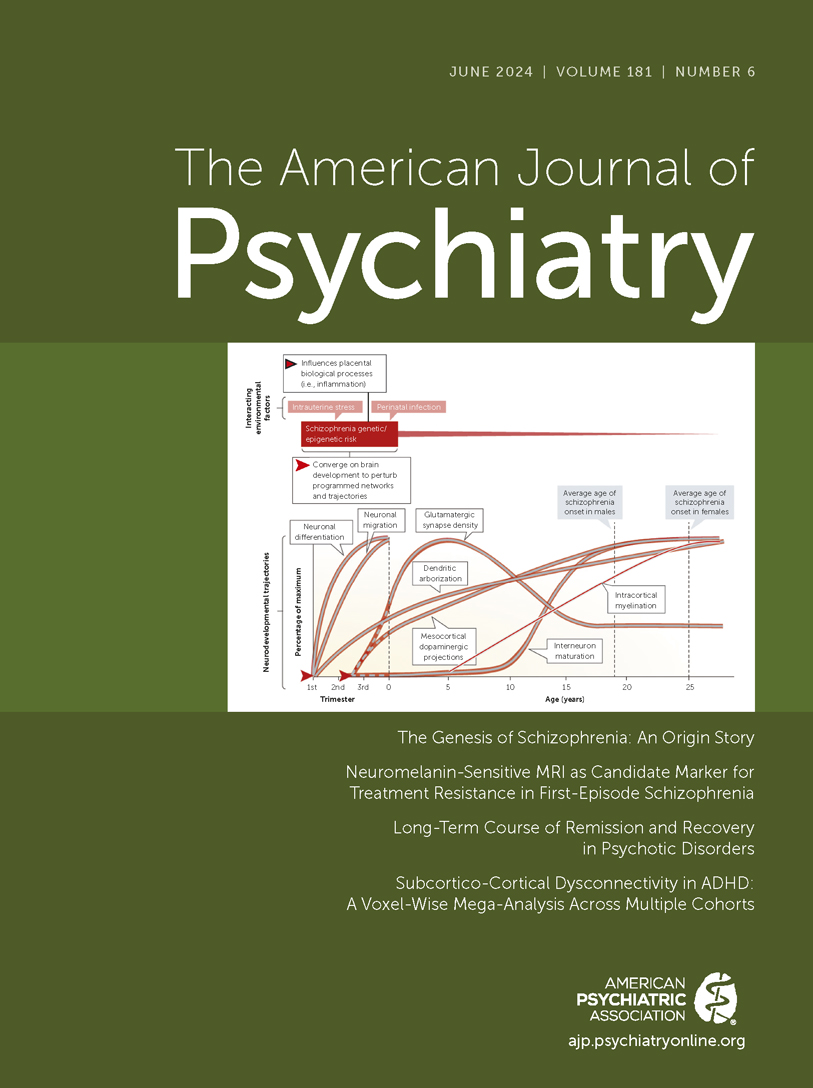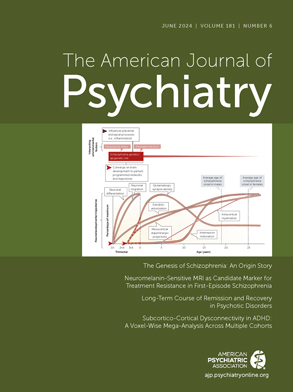The more things change, the more they stay the same, as the French expression goes (
Plus ça change, plus c’est la même chose), and thus it is with the results of the study reported by Tramazzo et al. in this issue of the
Journal (
1), where they conclude that clinical outcome is poor among patients with schizophrenia. So, what’s new? Didn’t we know this already? Kraepelin defined the illness, then called dementia praecox, based on the poor outcome he observed in his patients (
2). Indeed, he contrasted this poor outcome in schizophrenia with the much better one in the other major psychotic illness, now called bipolar disorder. Although things have changed—Tramazzo et al. studied an epidemiological sample, whereas Kraepelin based his conclusions on a selective (hospitalized) sample—things have stayed the same: outcome in schizophrenia, assessed with more modern and reliable methods, has not budged much in the 130 years since Kraepelin wrote about this disorder.
Tramazzo et al. followed a cohort of 628 patients between 15 and 60 years of age recruited from 12 inpatient facilities in Suffolk County, N.Y., with a first admission for a psychotic episode between 1989 and 1995. Follow-up interviews were conducted at 6, 24, and 48 months and at 10, 20, and 25 years. It is interesting, and telling, that less than one-half of the patients, 311 individuals, completed the 25-year interview; 159 had a diagnosis of schizophrenia, and the rest had “other psychoses.” Outcomes included remission in symptoms (according to Andreasen and colleagues’ remission criteria [
3]) and recovery (according to Liberman and Kopelowicz’s criteria [
4]). At the 25-year assessment point, none of the 159 patients with schizophrenia had experienced stable remission, and only one patient was in stable recovery; this contrasted with the (still rather poor) outcomes in the “other psychoses” group, with 15% and 21% in remission and recovery, respectively. Mortality, arguably a harder and even more relevant outcome, was 20% in the entire cohort (strangely, this outcome was not reported in the Results section but mentioned only in the Discussion section; moreover, it was not separated by group).
Of particular interest is the authors’ finding that although outcomes were not as dismal in the schizophrenia group initially as they were at the 25-year follow-up, outcomes worsened over time: at the 4-year follow-up, 25% of the patients with schizophrenia were in remission versus 0% at the final assessment. However, even at 4 years, this outcome was much worse than what was observed in the “other psychoses” group, where remission was over 50%. Indeed, to quote the authors, “the most common trajectory for individuals with schizophrenia spectrum disorders is one of no remission and no recovery.”
The argument is often made that poor outcome in schizophrenia reflects the inclusion of hospitalized patients only (
5). Tramazzo et al. acknowledge this limitation, but a large majority of patients with schizophrenia are hospitalized at some point during their illness: for example, Sommer et al. (
6) found, in a nationwide study in Finland, that 70% of schizophrenia patients were hospitalized or rehospitalized over a 10-year follow-up period.
What has this study added to our knowledge about outcomes in psychotic disorders? It has added evidence from an unselected sample of first-episode patients that long-term outcomes in schizophrenia are poor and worse than in patients with other (presumably mostly affective) psychoses. It bolsters the argument, often made, that despite the introduction of antipsychotics, now over 70 years ago, outcomes in schizophrenia have not materially improved or, at least, have certainly not improved enough (
7).
It could be claimed that using symptomatic outcomes, as was done here, is a poor measure of relevant societal outcomes, because the ability to live independently, have a (paying) job, and form enduring relationships may be more reflective of, and relevant for, a good quality of life. However, using these alternative yardsticks, outcomes in schizophrenia are not good either. Based on epidemiological data from Israel, covering the entire population of the country, less than 10% of patients with schizophrenia have a job (paid or unpaid) (
8). Most importantly, life expectancy is reduced by 20 years (
9). It is difficult to argue that much progress has been made in the treatment of schizophrenia based on these numbers—and still that argument is often made. In a meta-analysis, Molstrom et al. (
10) summarized outcome data from 14 studies, including almost 4,200 patients at baseline and fewer than 2,000 at follow up—again, an attrition rate of over 50%. One-quarter of the patients had recovered (definitions varied widely among studies) after, on average, 20 years. The authors concluded that “recovery is possible”—a rather low bar to clear, one could say. In a study of 128 schizophrenia patients, Simonsen et al. (
11) reported that despite low rates of clinical recovery (roughly one-third of the sample had achieved “clinical recovery” at the 10-year follow-up), slightly over 60% were satisfied with their lives. The authors concluded that their results “must be shared to instill hope.” This conclusion touches on the crux of the outcome debate in schizophrenia (
12). Should we be satisfied with an illness outcome where two-thirds of patients fail to recover from their illness (on the basis of Simonsen and colleagues’ study results), and only 0.6% recover if we follow the results of Tramazzo et al.? Should we accept the fact that patients with schizophrenia have a 20-year shorter lifespan? Should we “instill hope” when schizophrenia patients almost never obtain a well-paid position in society (
7)?
The continued poor outcome in schizophrenia, emphasized and highlighted (again) by the results of Tramazzo et al., suggests—with important implications for our understanding of the pathogenesis of schizophrenia—that antipsychotics, despite being highly effective in reducing psychosis, have little effect on the long-term outcome in schizophrenia. Indeed, their study did not find that antipsychotic use predicted (good) outcome, whereas lithium treatment increased the chances of recovery more than fivefold (presumably in the “other psychoses” group). These findings underline the argument that if we are to improve outcome in schizophrenia, we will need to look beyond the treatment of psychosis (
7).
It is unfortunate that no indices of cognitive function were included in the study, because these could have served (even if measured only at baseline) as an important predictor of outcome. It has been shown, and replicated many times, that cognitive function is one of the most powerful predictors of outcome in schizophrenia (
13). What’s more, antipsychotics have little or no effect on cognitive performance other than that related to and associated with the reduction in psychotic symptoms (
14).
It has been argued that outcome in schizophrenia is not as poor as Kraepelin described, often citing Bleuler’s work and later studies, suggesting that when less selective samples are studied, outcome is not as poor as originally described by Kraepelin (
5). However, the study by Tramazzo et al. puts paid that argument. We should take the results of their study as a clarion call to elucidate the causes of schizophrenia in order to finally improve outcome in these patients, a century and a half after the illness was first defined on the basis of that (poor) outcome. Little has changed. We should make sure it does now.

